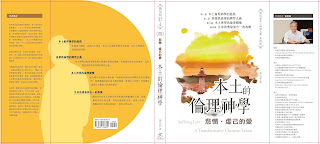總網頁瀏覽量
2023年6月6日 星期二
Mission: Church in Formation 〔認同:在地宣教〕
2022年12月1日 星期四
Contextual Theological Education
2022年10月7日 星期五
悲憫‧ 虛己的愛 -- 本土的倫理神學
2021年12月28日 星期二
神學的典範轉移
誌 台灣本土神學文集的出版
從事本土神學的書寫工作逾五十個年頭,從初次接觸基督教信仰到進入神學院,朦朦朧朧的透視到有限生命背後之超越無限的奧秘。在青澀的年代開始以「上帝與我」為題,書寫了幾篇連載的短文。那是還不懂甚麼是神學的年紀。那些掙扎著窺視生命奧秘的文字,如今讀來卻好像是我整個神學旅程的重要奠基石。
如今,年逾七十。拉拉雜雜書寫過的神學相關文字應不下百萬字。偶而舊文重讀,總會感受到年輕時那股企圖轉身、探索祕境的衝動與傻勁,似乎並未隨著年紀增長而有所消退。每次提筆撰文,總自信滿滿的認為自己有新的看法,有獨特的見解。長久以來自己也確實努力想不斷超越自己。只是蓦然回首,好像又從未離開一路走來的軌跡。是神學心靈的不安,或是對超越之渴望的無奈,這一路以來的神學書寫,就像失鄉的遊子,遊走於曠野漫漫。雖然途中不乏珍木奇石,卻體驗不到抵家的安穩。
從長榮大學退休後,在恩惠文教基金會支持下成立了台灣本土神學研究中心。讓我體驗到了諾貝爾和平獎得主尤努斯的銘言:沒有人是出生來被聘雇的(no one is born for employment)。這個人生的大轉身 (退休),總算讓我有機會想想如何為矌野游走多年的台灣本土神學搭個遮風避雨的【殿宇】。在長榮大學任職期間,好幾次與周勉博士 (MP Joseph) 商討撰寫本土神學的參考文獻,也曾多次與莊雅棠牧師籌劃編輯神學資源手冊,並曾付之實施卻沒能完成。因此,在中心成立後,除了組織本土神學讀書會,舉辦研討會及出版本土神學系列叢書外。也再次興起編輯本土神學資源手冊的念頭。在幾位年輕的神學同工參與下,我們成立的台灣本土神學資源手冊編輯小組,開始籌劃分工。與此同時,我也有幸把我過去畢生書寫的作品所有版權捐贈給中心,重新整理出版,希望提供對本土神學有興趣的朋友一個入門的參考。
第一冊就把它命名為 「旅 - 轉身與起程」,以敘述方式談論神學的典範轉移。這文集的出版,最讓我欣慰的是得到一位素昧平生的年輕朋友羅傳樵先生同意我使用他十幾年前在網路評論我的神學思想的一篇短文做為評介文。羅先生不是神學本科的學者,因此,這評介應該可以讓更多關心宗教、關心神學的人容易親近我這些文字。希望整套文集的出版有助於台灣本土神學的投石問路,邀請更多人來關心與參與。
2020年6月20日 星期六
印度之旅
心靈秘境

 |
| AFTM籌備成員在希倫坡大學集會 |

2019年5月26日 星期日
Teotihuacan 的日月神廟 - 凝視墨西哥的文化深層
2018年2月16日 星期五
輕井澤驚喜之旅
2016年6月30日 星期四
對談,塞納河畔 -- 巴黎天主教大學主辦之「跨文化及跨宗教之理性對談」國際研討會記趣
 被通知參與雜誌編委後,馬上就被放入編輯群的工作行列,主要都是用email聯繫。透過email的討論、提議,加上每年一次的年會作統整。一年出刊五期的學術雜誌,2015年的年會中已經把主題安排到2017年底。這段時間不斷接到的通聯都是在累積2018以後的題目。每期刊物都由編委分組負責規劃、邀稿及編輯工作。其嚴謹及用心,編委參與的積極都讓我大開眼界。去年九月(2015)巴黎天主教大學神學院院長Fr. Thierry Marie Courau來信要我準備參加2016年在巴黎召開的年會。並指定我在年會前的一個由該大學主辦,法國道明會、及Theologicum協辦的Symposium中談談東方人的文化與思考模式。
被通知參與雜誌編委後,馬上就被放入編輯群的工作行列,主要都是用email聯繫。透過email的討論、提議,加上每年一次的年會作統整。一年出刊五期的學術雜誌,2015年的年會中已經把主題安排到2017年底。這段時間不斷接到的通聯都是在累積2018以後的題目。每期刊物都由編委分組負責規劃、邀稿及編輯工作。其嚴謹及用心,編委參與的積極都讓我大開眼界。去年九月(2015)巴黎天主教大學神學院院長Fr. Thierry Marie Courau來信要我準備參加2016年在巴黎召開的年會。並指定我在年會前的一個由該大學主辦,法國道明會、及Theologicum協辦的Symposium中談談東方人的文化與思考模式。 在巴黎與陳文團教授重逢是個驚喜。陳教授八、九年前與我到海德堡一起參加會議熟識後,一直保持斷斷續續的聯繫,身為哲學大師,在台灣桃李遍佈的學者,他的平易近人,親切友善,是我很敬重的學者。從台大退休後,一直沒機會再見面。沒想到在第一天的開幕會後從身後一隻友善的手拉住我,才知道這次會議除了我之外還有來自輔大的四、五位學者參加。輔大與巴黎天主教大學的神學院有合作關係。類似的研討會雖人數沒這次多(這次也是慶祝道明會創會八百年的活動之一),在兩校間輪流主辦也有一段時間。希望未來在台灣舉辦時能讓更多不同大學的學者有機會一起參與。
在巴黎與陳文團教授重逢是個驚喜。陳教授八、九年前與我到海德堡一起參加會議熟識後,一直保持斷斷續續的聯繫,身為哲學大師,在台灣桃李遍佈的學者,他的平易近人,親切友善,是我很敬重的學者。從台大退休後,一直沒機會再見面。沒想到在第一天的開幕會後從身後一隻友善的手拉住我,才知道這次會議除了我之外還有來自輔大的四、五位學者參加。輔大與巴黎天主教大學的神學院有合作關係。類似的研討會雖人數沒這次多(這次也是慶祝道明會創會八百年的活動之一),在兩校間輪流主辦也有一段時間。希望未來在台灣舉辦時能讓更多不同大學的學者有機會一起參與。2016年1月5日 星期二
Objectives of the Academy
- To
study and research on Christianity as an integral part of Asian history
and tradition.
- To
promote a forum for Asian Christian Intelligentsia to dialogue with the
larger society and critically reflect on its social, political, economic
and cultural situation.
- To
provide an interdisciplinary basis for Christian social engagement.
- To
facilitate the meeting and interaction among Asian Christian intellectuals
and channel their human resources towards transformation of society.
- To
promote inter-religious understanding and religious freedom in dialogue
with peoples of other faiths.
Impact of the Academy and the Journal
Editorial Board
Periodicity
Publication & Marketing
Administration & Organization
Stages Leading to the Realization of the Project
- An
initial exploratory consultation will discuss the nature of the academy,
its scope, membership, structure, functioning etc. It will also discuss
the orientation to be adopted by the proposed journal and chalk out the
guiding principles, nature, scope, readership. It will also explore
possible publishing houses with whom the journal can tie-up for
publication and marketing. The consultation will pool the names of scholars
who could serve on the advisory board of the journal. It will also suggest
a larger pool of names for membership in the academy and criteria to be
part of it.
- Convocation
of the first editorial board meeting. The editorial board will go deeper
into the deliberations of the consultation and fine tune the orientation
of the journal, its nature and scope. It will lay down the editorial
policy and other technicalities for publication and distribution. The
Academy and the journal will work in tandem.
- The
constitution of the Academy and selection of international office-bearers.
- Publication
of the first issue of the journal. March 2017.
2014年10月20日 星期一
Great Gift of Festschrift from Friends
 |
| 新增說明文字 |
Doing Contextual Theologies in Asia
Essay in Honour of Huang Po Ho
Contents
Acknowledgement
Contributors
M. P. Joseph: Foreword
1. Fu Ya Wu: The Development of Contextual Theology and Po Ho's Contribution
2. Ya Tang Chuang: A Theological Hermeneutics of the Other for Inter-religious Dialogue
3. Wati Longchar: Asian Liberation Theology: Location and Methodology - An Indigenous Perspective
4. Edmund Kee-Fook Chia: Contextualizing Evangelii Gaudium in Asia
5. H.S. Wilson: Contextual Theologies to Theologies of Connectivity
6. K.C. Abraham: A renewed Call for Prophetic Ecumenism
7. S. Wesley Ariarajah: Towards a More Radically Indigenized Asian Christian Missiology
8. Hope S. Antone: Expanding Christian Education for Mission
9. Limatula Longkumer: Critical Pedagogy and Its Implication for Theological Education
10. Hong Jung Lee: "I am at the Mercy of the Rats": Seeking the Kenotic Interdependent Way of God's Economy of Life
11. Sze-kar Wan: Love and Violence: An Exegetical Reflection on Christian Political Engagement in Asia
12.Emanuel Gerrit Singgih: Trapped in a Contradiction: Buildings as Symbol of Service to Religion or to Community?
13. Atola Longkumer: Indigenous Religion/s in Asia: Enlarging Theological Curriculum
14. Dietrich Werner: Global Learning in Theological Education in The 21st century - Perspectives From WCC-ETE











